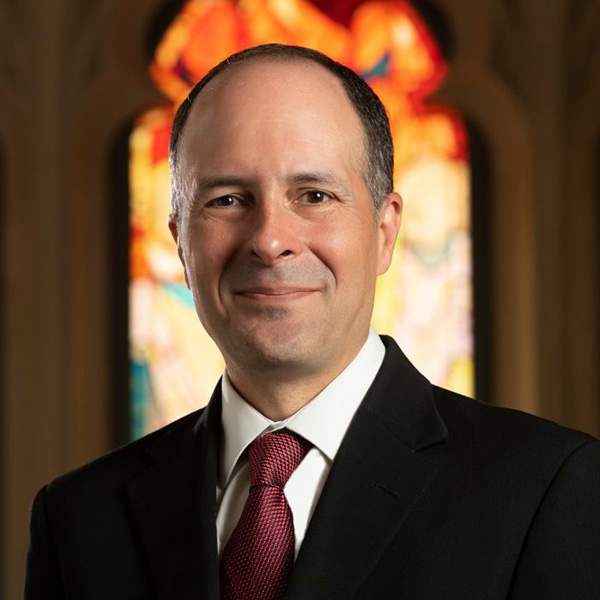Editor’ s note: Faith & Leadership offers sermons that shed light on issues of Christian leadership. The following is adapted from a sermon preached at the Alamance Presbyterian Church in Greensboro, North Carolina, Sept. 9, 2018, for Big Meeting Sunday, part of the church’s annual weeklong Big Meeting revival and homecoming, first held in 1801.
I am delighted to be with you as you celebrate Big Meeting, which I understand is a long-standing family reunion of sorts for your church. My name is Erin Lane, and I am an author, facilitator and theologian who lives in Raleigh with my improbable family: a youth-pastor husband and our three adopted girls.
The truth is, adopted families like ours can be a tricky thing to celebrate in community. My husband, Rush, and I have gotten all sorts of responses since we began fostering our girls almost two years ago and then adopted them last summer.
“Congrats.”
“Wow.”
“Bless you.”
One card read: “Congratulations on your adoption. Have fun answering inappropriate questions.” Seriously, card companies are making these cards now.
The response that has stumped me the most, though, has been “Thank you.” It makes me wonder, did I do you a favor? Our girls a favor? Society a favor? To be frank, I’m not sure I even believe in altruism. I think of Phoebe in that episode of “Friends” where every time she tries to do a good deed, everything comes back around to benefit her. Good deeds do not interest me as much as mutual needs.
Out of all the responses we’ve received, the best has been “Huh.” The first time I heard it was from a college friend I hadn’t seen in a while. She heard from afar that we were fostering and called to catch up. We had long shared an ambivalence about kiddos, and I think she was curious how we found ourselves so suddenly with three of them. At the end of 20 minutes, she said that she too had been considering fostering but until we talked had thought it was for people … I don’t know … “nicer” than the two of us.
“But if someone like you can foster -- huh, I don’t see why I can’t.”
I hung up prouder than I’d ever been. The fact that Rush and I were such unnatural choices as foster parents is what gave her the spark to try.
I couldn’t quite put my finger on why most responses to the adoption -- “Congrats,” “Wow,” “Bless you,” “Thank you” -- bothered me until I realized that most of this bewildering goodwill was coming from folks who considered themselves my “church family.” And that’s when it hit me. Who should know better about the ordinary means by which extraordinary kin come together than the church? Adoption should be no surprise at all in the supra-natural family of God.
I grew up in the church, first the Catholic Church and then a more charismatic one. I studied the church, first in my teen Living Bible and then in divinity school. Shoot, I even married a Methodist youth pastor. But the metaphor of church as family, no matter how many times I’ve heard it, gives me pause.
And why shouldn’t it? It’s an overfamiliar metaphor -- already a roadblock for this writer -- that’s been used in American Christianity to idolize what we call “traditional family values.” In the traditional family, there are typically insiders and outsiders. There is legitimate and illegitimate. There is “blood is thicker than water” and “what happens in the family stays in the family.” How this image of family has become so popular in the church baffles me when Jesus appears totally uninterested in it.
Once you start reading the Gospels, it’s hard to sustain the argument that Jesus was pro- our notion of the modern, nuclear, biological family. Consider just a few cantankerous comments he made that the biblical authors thought worth capturing.
When told that his biological mother and brothers were looking for him in a crowd, Jesus said, “My mother and brothers are those who listen to God’s word and do it” (Luke 8:21 CEB).
Point taken.
Another time, after having heard him speak, a woman overcome with awe shouted, “Happy is the mother who gave birth to you!” And Jesus is like, Hmm -- “happy rather are those who hear God’s word and put it into practice” (Luke 11:27-28).
Are you noticing a theme?
In Luke’s Gospel, Jesus is even recorded to have said, “Whoever comes to me and doesn’t hate father and mother, spouse and children, and brothers and sisters -- yes, even one’s own life -- cannot be my disciple” (Luke 14:26).
Commentators have been trying to make sense of that one ever since.
What is clear, over and over again, is that Jesus refuses to identify with his traditional family and instead spins a new vision of family: one in which shared practice, not shared parentage, binds together the people of God.
This is the message we find John the Baptist preaching in the third chapter of Luke’s Gospel in order to prepare the Jewish people for the Jesus way.
The chapter opens with a Who’s Who of power brokers:
In the fifteenth year of the reign of Emperor Tiberius, when Pontius Pilate was governor of Judea, and Herod was ruler of Galilee, and his brother Philip ruler of the region of Ituraea and Trachonitis, and Lysanias ruler of Abilene, during the high priesthood of Annas and Caiaphas, the word of God came to John son of Zechariah in the wilderness. (Luke 3:1-2 NRSV)
First on this list is the Roman emperor Tiberius Caesar, who happened to be the adopted son of Augustus. Now, this wouldn’t have been all that surprising to its earliest listeners. Adoption in the ancient world was a common practice, done for the sake not of charity or good deeds but the continuation of a family’s good reputation.
It turns our modern assumptions on their heads, doesn’t it? Adopted heirs were esteemed for their predictable pedigree, while biological heirs were far riskier. We can hardly imagine someone admonishing a pregnant mother now with, “You never know who you might end up with.”
John, like Jesus, was not interested in pedigree. His message was that baptism, not biology, is what saves a life. And it’s what gave shape to John’s life as he traveled in the wilderness telling people to repent by quoting the Hebrew prophet Isaiah:
Prepare the way of the Lord,
make his paths straight.
Every valley shall be filled,
and every mountain and hill shall be made low,
and the crooked shall be made straight,
and the rough ways made smooth;
and all flesh shall see the salvation of God. (Luke 3:4-6)
Salvation’s song would be sung over, not just those upright families who wash their hands before supper, spend their money on organics or limit their screen time, but all flesh. All children. All parents. All people who were done hustling for their worth.
It sounds nice, doesn’t it? And yet we know it was a hard message to hear. Apparently, some of John’s followers took baptism to be another means by which they could strive for spiritual standing. For the Jews, being able to trace their lineage back to Abraham, the patriarch of whom God promised to make a great nation, was a sign that they were God’s favored children. Belonging to God was their birthright. But like favored children, some were anxious to remain the chosen few. Sensing that they were coming out in droves to perform rather than to be transformed, John said to them:
You brood of vipers! Who warned you to flee from the wrath to come? Bear fruits worthy of repentance. Do not begin to say to yourselves, “We have Abraham as our ancestor”; for I tell you, God is able from these stones to raise up children to Abraham. (Luke 3:7-8)
In no uncertain terms, John is telling them that their long-cherished biological connection to Abraham is no longer what matters most. God could have made Abraham’s children out of stones. It no longer matters whether the family line is natural or unnatural when God is doing the supra-natural through Jesus. Jesus upends their “traditional family values.” Jesus makes it so that anyone can find kinship with one another.
What matters, John says, is whether your life bears fruit, not your loins:
Even now the ax is lying at the root of the trees; every tree therefore that does not bear good fruit is cut down and thrown into the fire. (Luke 3:9)
What matters, this passage says, is that you’ve grown a change of heart and your life is growing others. This is what the ritual of baptism was for: to mark that you were ready to let go of old scripts and begin the story again. In this way, baptism ritualizes not just a beginning but a returning to a time when, before we were ever born, God first chose to belong to us. Family, it turns out, has always been bigger than DNA.
The main problem, then, with the “traditional family” being considered synonymous with the church -- and Americans both in and out of the church see it this way -- is that people in nontraditional families often feel less at home among us. Singles. Single parents. Childless couples. Widows. And where does the stranger fit in this family metaphor? We’ve celebrated the church as family without ever clarifying what kind of family we’re called to be. And what kind of family is the church if not an adopted one?
Rush and I never intended to become an adopted family. For 10 years prior, we were prayerfully and purposefully what we called “child-free for the common good.” To be child-free for the common good is to recognize that saying no to one kind of parenting can free you up to say yes to community of another kind. And so we decided to practice the ministry of availability to other people’s children. The idea delighted me so much that I might have printed it on business cards and handed it out at church picnics: “Hello. My name is Erin. Minister of Availability, at your beck and babysitting call.” But for reasons I can try to explain but change every time I do, few people called on us. So we called on the Department of Social Services.
To be certified as a foster parent in Durham County, you have to take a 30-hour class on parenting children of trauma. The motley crew that came together in a classroom where biology is not destiny and a love life is not the only life was magic. There was a broad-shouldered black man who wanted better for the boys he youth-pastored. There was a mixed-faith couple who had buried a son and had begun to unbury their faces. There was a conservative white couple whose church took the Christian call to love widow and orphan so seriously that they offered free child care for anyone who followed the call to this class. How lucky we were to practice family together, free from a formula.
We were in the business of reunification, not adoption, our instructors reminded us. Three sisters, ages 10, 8 and 6, were our first and last placement. We drove them home from school one wintry afternoon in January -- I can still see them in the back seat of our Honda Fit, packed like sardines in their puffy jackets -- and by August, their parents’ rights had been terminated. They still wanted to go home. And we still wanted them to be able to. The truth is, we became family out of necessity first, and then only gradually something more like love. I suppose that’s why “Congratulations” never felt quite right once the adoption became final. Adoption often begins with someone’s grief, even as it turns into someone’s gift.
I am admittedly green when it comes to the world of adopted families. What I do know, though, is that it has taught me much about belonging to the adopted family of God. And adoption was how Paul conceived of the early Christians’ relationship to God. When Jesus is baptized, God’s voice envelops him, calling him the beloved and chosen Son. Likewise, when we are baptized with Jesus, God’s voice envelops us and calls us beloved and chosen children. We become, like the imperial families of Rome, God’s adopted heirs to carry out not the family line but the family practice.
One of the biggest surprises of the research I did for my book “Lessons in Belonging from a Church-Going Commitment Phobe” was that there is no Greek word that directly translates as “belonging” in the New Testament. So when we read the apostle Paul’s encouragement to the early Christians that “you belong to Christ” (1 Corinthians 3:23), the more wooden translation is “you are of Christ.” In the adopted family of God, we are of Christ before we are of Erin or of Patty or of Bob. We loosen our grip on any special privileges or deep wounds associated with the family we were born to or adopted by or raised with, because we now have a common heritage. We are not imprisoned by our past.
We are of Christ because God first adopted us. It is not an earned belonging. That’s what I love about the New Testament translation of the word. But in the Old Testament, there’s a word for belonging that’s much more concrete. The Hebrew noun for belonging refers to the part or portion of the congregation’s sacrificial offering that’s assigned to us. We don’t appear to have much say in what our offering is. But we do get to choose whether and when and to whom we offer it. And it’s not just about offering ourselves to one another but pouring ourselves out for a greater good. In the Old Testament books of Nehemiah and Esther, we see the word for belonging in the phrase “sending portions” -- sending portions unto them for whom nothing is prepared, or sending portions one to another and gifts to the poor (Nehemiah 8:10, 12; Esther 9:19, 22) -- a reminder that our belonging is inextricably bound up with the longing of the marginalized.
If we faithfully read just beyond where our Scripture passage in Luke chapter 3 ended today, it becomes clear that in the adopted family of God, economic justice is one of our chief family practices. When John the Baptist is asked what exactly one’s called to do after baptism, he answers with three examples (Luke 3:10-14):
- Give away your excess.
- Take no more than you need.
- Be content with what you have.
Fostering or adopting can be one way to practice economic justice, but even better would be practices that make the need for fostering and adopting less pressing in this country.
We unequivocally would not have adopted if it hadn’t been for a conversation with one of our government-funded care providers. When it became clear that our girls couldn’t return home, we started discerning whether we could be a home for them. We thought yes but had fears, so many fears.
“What if we don’t enjoy it?” we asked one of the girls’ therapists.
“What do you do for fun now?” she replied. “Keep doing that.”
“Oh, OK,” we said. “Well, what if we don’t feel it? What if we never feel the connection?”
“Then you get to work,” she replied. “Some loves, like romantic loves, are born of feeling. Other loves take practice. But that doesn’t make it any less love and you any less worthy.”
We decided on the spot we were in.
This is the good news of belonging to the adopted family of God: you don’t have to feel all the feels to be a part of this family. You can let intention lead to authenticity. You can let practice take the place of performance. You can let connection be more important than charity. And if our church family doesn’t bewilder others, we’re doing it wrong.
According to Jesus’ earliest followers, the church family is the adopted family. In her beautiful book “Adopted: The Sacrament of Belonging in a Fractured World,” Kelley Nikondeha, both an adopted child and an adoptive mom, writes, “If adopted families are an anomaly, we skew supra-natural.”
Notice she doesn’t say adopted families are supernatural -- somehow separate from the natural family -- but supra-natural, inclusive of so much more than the natural family.
She continues: “We have learned how to belong to one another beyond the boundaries. Our formation allows us to cultivate belonging with anyone unlike us because we know that it’s always possible to graft someone into our family tree. Point us to the arid places, and we will break the ground and plow it toward connection and kinship. It is our superpower.”
Friends, here’s the payoff when we choose to live like the adopted family of God: we become more at home, not only in our own skin or with one another, but we become more at home in the world. We develop the supra-natural ability to belong to anyone, if we choose.
Thanks be to God.













